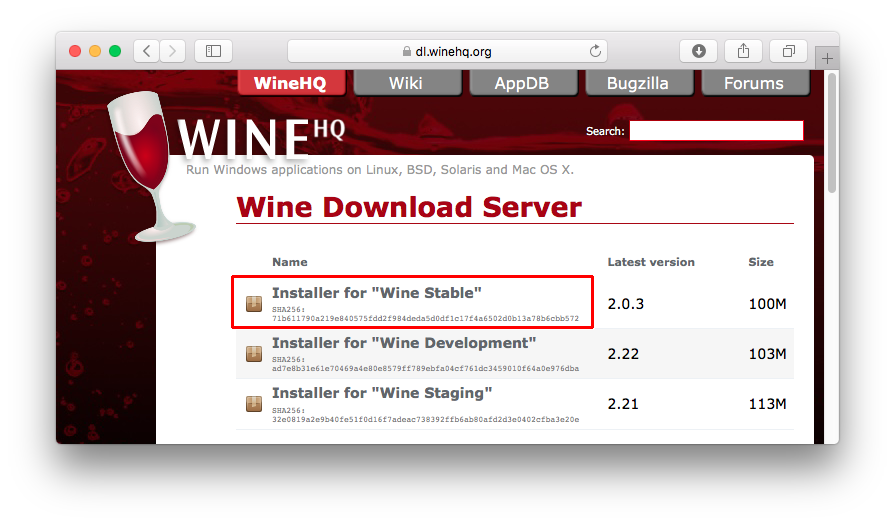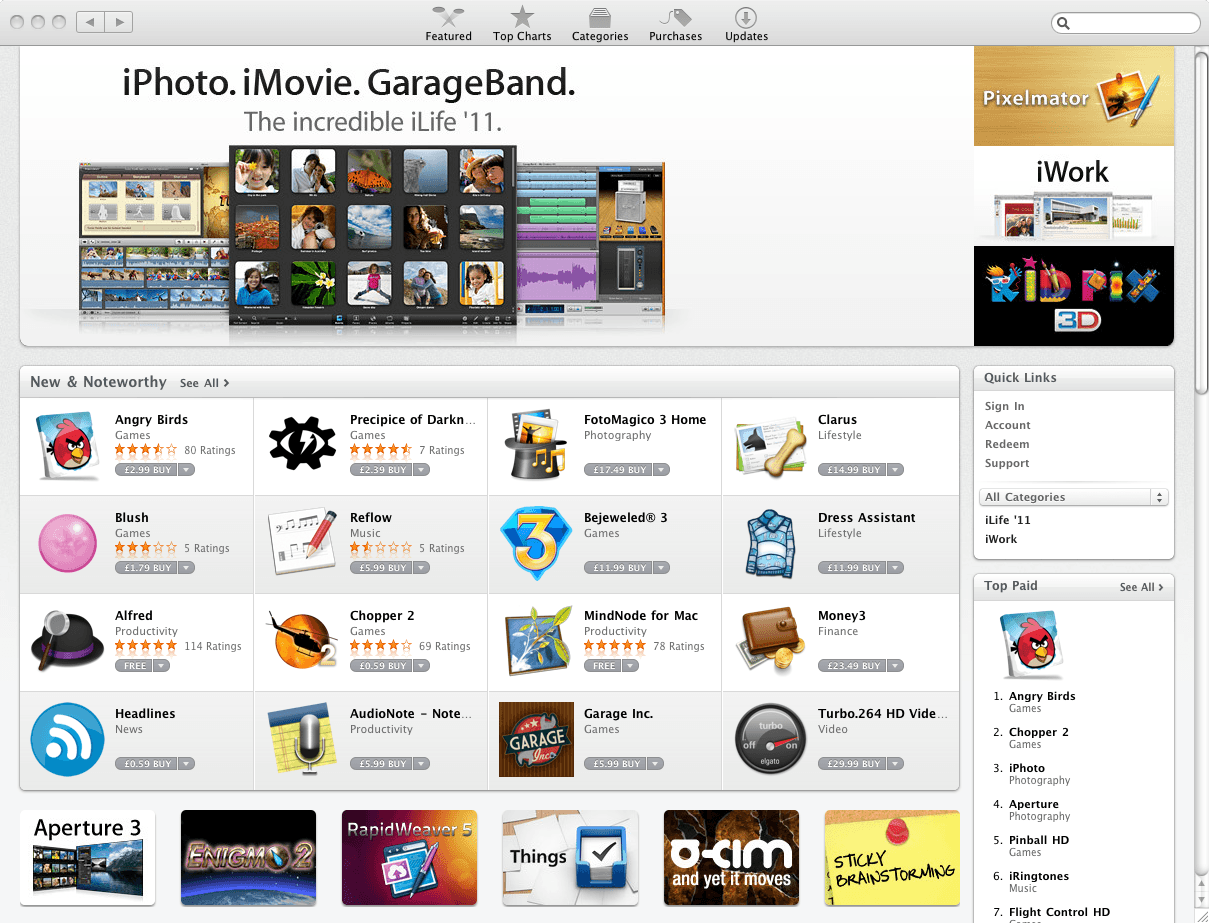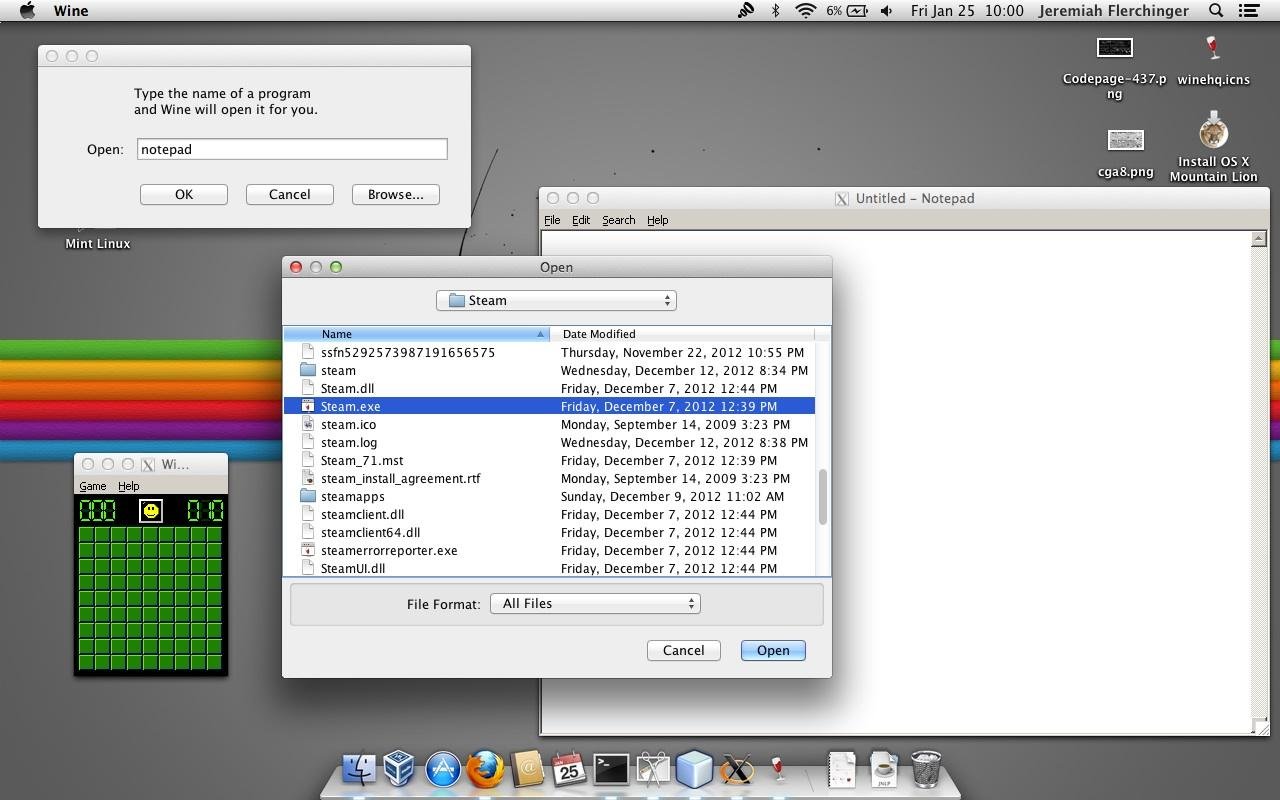- PlayOnMac will allow you to play your favorite games on Mac easily. Wine distribution: upstream. Make install 32 bits. 100% 100% wine-5.0.2. Operating System: darwin x86. Wine distribution: upstream.
- After upgrading to Catalina, Wine no longer works at all. When I attempt to launch my 'Wine Stable' app, I get the following message: “Wine Stable.app” needs to be updated. The developer of this app needs to update it to work with this version of macOS. Contact the developer for more information.
- WineBottler packages Windows-based programs snugly into OS X app-bundles. No need to install emulators or operating systems - WineBottler uses the great open-source tool Wine to run the binaries on your Mac.
Translations of this page:简体中文
Supported Wine
App for wine lovers, collectors or enthusiasts. Paid Publisher: SilverCocoa Downloads: 122. Paid Putty for Mac. Access servers through various protocols.
| CrossOver is a polished version of Wine provided by CodeWeavers. CrossOver makes it easier to use Wine and CodeWeavers provides excellent technical support to its users. All purchases of CrossOver are used to directly fund the developers working on Wine. So CrossOver is both a great way to get support in using Wine and to support the Wine Project. CodeWeavers provides fully functional trial versions of CrossOver. |
Wine Binary Packages


| WineHQ Binary Packages | ||
| These packages are built and supported by WineHQ. Please report any problems with them in WineHQ's bugzilla. |
| Android - WineHQ binary packages for Android | Maintainer:Alexandre Julliard |
| Ubuntu - WineHQ binary packages for Ubuntu 18.04, 20.04, and 20.10 Debian - WineHQ binary packages for Debian Buster and Bullseye | Maintainers:Rosanne DiMesio,
|
| macOS - WineHQ binary packages for macOS 10.8 through 10.14 | Maintainer: none |
| Distro Binary Packages | ||
| These packages are built and supported by the distros. Please report any problems with them to the package maintainer. |
| SUSE - release binary and source .rpms and daily snapshot RPMs for all openSUSE versions (Leap and Tumbleweed) and SUSE Linux Enterprise 12 and 15 | Maintainer:Marcus Meissner |
| Slackware - binary txz (Slackware 14.2), and tgz (for older versions) | Maintainer:Simone Giustetti |
| FreeBSD - source for FreeBSD 5.3 or later | Maintainer:Gerald Pfeifer |
3rd Party Tools
Sometimes a customization of Wine can cause an application to work, but this change cannot be incorporated into Wine for some reason. To help overcome current deficiencies in Wine, various third party applications for end users have been made over the years. These applications are entirely unsupported by the Wine developers, however you may find them useful. For more information, see our wiki page on Third Party Applications.


Wine Source Downloads
WineHQ download server - our official source release site.
Git - instructions for building Wine from git.
ibiblio.org - alternative download site for the official source and documentation tarballs.
See Building Wine for help on configuring and building Wine.
Linux users who want to run Windows applications without switching operating systems have been able to do so for years with Wine, software that lets apps designed for Windows run on Unix-like systems.
Wine For Macos
There has been no robust equivalent allowing Mac applications to run on Linux, perhaps no surprise given that Windows is far and away the world's most widely used desktop operating system. A developer from Prague named Luboš Doležel is trying to change that with 'Darling,' an emulation layer for OS X.
'The aim is to achieve binary compatible support for Darwin/OS X applications on Linux, plus provide useful tools that will aid especially in application installation,' Doležel's project page states. Darwin is Apple's open source operating system, which provides some of the backend technology in OS X and iOS. The name 'Darling' combines Darwin and Linux. Darling works by 'pars[ing] executable files for the Darwin kernel... load[ing] them into the memory... and execut[ing] them.'
But there is a ways to go. 'Darling needs to provide an ABI-compatible [application binary interface] set of libraries and frameworks as available on OS X... by either directly mapping functions to those available on Linux, wrapping native functions to bridge the ABI incompatibility, or providing a re-implementation on top of other native APIs,' the project page notes.
Doležel, who started Darling a year ago, described the project and its progress in an e-mail interview with Ars. Darling is in the early stages, able to run numerous console applications but not much else. 'These are indeed the easiest ones to get working, albeit 'easy' is not the right word to describe the amount of work required to achieve that,' Doležel said. 'Such applications include: Midnight Commander, Bash, VIM, or Apple's GCC [GNU Compiler Collection]. I know it doesn't sound all that great, but it proves that Darling provides a solid base for further work.'
Users must compile Darling from the source code and then 'use the 'dyld' command to run an OS X executable,' Doležel said. One roadblock is actually getting Mac .dmg and .pkg application files working on a Linux system. Because doing so isn't that straightforward, Doležel said, 'I've written a FUSE module that enables users to mount .dmg files under Linux directly and without root privileges. An installer for .pkg files is underway.'
Unix/Linux synergy
The fact that OS X is a Unix operating system provides advantages in the development process. 'This saved me a lot of work,' Doležel explained. 'Instead of implementing all the 'system' APIs, it was sufficient to create simple wrappers around the ones available on Linux. I had to check every function for ABI compatibility and then test whether my wrapper works, so it wasn't as easy as it may sound.'
Another lucky break not available to Wine developers is that Apple releases some of the low-level components of OS X as open source code, 'which helped a lot with the dynamic loader and Objective-C runtime support code,' Doležel noted.
But of course, the project is an extremely difficult one. Doležel isn't the first to try it, as Darling was initially based on a separate project called 'maloader.' Doležel said he heard from another group of people 'who started a similar project before but abandoned the idea due to lack of time.'
Doležel was actually a novice to OS X development when he started Darling, being more familiar with OS X from a user's perspective than a developer's perspective. 'I have personally looked for something like Darling before, before I realized I would have to start working on it myself,' he said.
Darling relies heavily on GNUstep, an open source implementation of Apple's Cocoa API. GNUstep provides several core frameworks to Darling, and 'the answer to 'can it run this GUI app?' heavily depends on GNUstep,' Doležel said. Doležel is the only developer of Darling, using up all his spare time on the project.
No reverse-engineering
Doležel isn't reverse-engineering Apple code, noting that it could be problematic in terms of licensing and also that 'disassembling Apple's frameworks wouldn't be helpful at all because Darling and the environment it's running in is layered differently than OS X.'
Wine And Winebottler
The development process is a painstaking one, done one application at a time. Doležel explains:
To improve Darling, I first take or write an application I'd like to have running. If it is someone else's application, I first examine it with one of the tools that come with Darling to see what frameworks and APIs it requires. I look up the APIs that are missing in Apple's documentation; then I create stub functions for them and possibly for the rest of the framework, too. (Stub functions only print a warning when they are called but don't do any real work.)
The next step is to implement all the APIs according to the documentation and then see how the application reacts. I also add trace statements into important functions to have an insight into what's happening. I believe this is very much like what Wine developers do.
When things go wrong, I have to use GDB [GNU Debugger] to debug the original application.
Apps Like Wine For Mac
It is rather unfortunate that Apple's documentation is often so poorly written; sometimes I have to experiment to figure out what the function really does. Many OS X applications seem to contain complete pieces of example code from Apple's documentation, presumably because one would have to spend a lot of time getting to understand how the APIs interact. This is why I appreciate open source so much—when the documentation is sketchy, you can always look into the code.
Years of development are needed. Similar to Wine, 'Having a list of applications known to be working is probably the best way to go,' Doležel said.
Darling should work on all Linux distributions, he said, with the catch that 'many apps for OS X are 32-bit only, and installing 32-bit packages on a 64-bit Linux system could be tricky depending on your distribution. I personally use Gentoo Linux, so I'm gradually creating a Portage overlay that would compile Darling and all dependencies for both 32-bit and 64-bit applications.'
Wine For Mac Apps Downloads
Doležel would like to bring Angry Birds, other games, and multimedia applications to Linux. Darling could potentially 'be used to run applications compiled for iOS,' he writes on the project site. This will also be a challenge. 'The intention is to support the ARM platform on the lowest levels (the dynamic loader and the Objective-C runtime),' he writes. 'Rewriting the frameworks used on iOS is a whole different story, though.'
